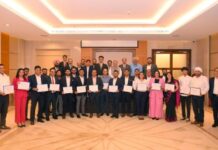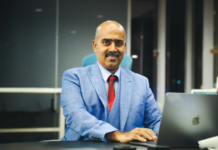Board Member Michael Mager Presents Grohe Dual Tech Programme at Don Bosco Sustainability Conference in Mumbai, India
Assuming responsibility for people and the environment is one of the key values of the GROHE brand. This is why the sanitary fittings manufacturer has teamed up with Don Bosco Mondo e.V. to help underprivileged children and young people in the poorest regions of the world. The GROHE project launched in Mumbai, India, in 2009 will now be further expanded. At the Don Bosco Sustainability Conference held in Mumbai on 4 – 6 February, GROHE Board member Michael Mager will present the award-winning concept to an international audience.
Conference Aimed at Improving a Sustainable Lifestyle
The International Conference on Technologies for Sustainable Development (ICTSD) 2015 will be organised by the Don Bosco Institute of Technology (DBIT) in cooperation with the Institute of Electrical and Electronics Engineers (IEEE), the world’s largest professional association for the advancement of technology. The event marks the bicentenary of the birth of Don Giovanni Bosco, a Catholic priest and youth pastor who founded the Order of the Salesians. By hosting the event, the Salesians of Don Bosco want to encourage the global community to use scientific findings and research to support a sustainable lifestyle. The main focus is on introducing young people to the new technologies.
 Topics addressed at the three-day conference include Energy, Design, Water, Agribusiness, Waste Management and Transport. GROHE will not only act as sponsor of the event but also contribute to its contents. “The ICTSD is a great platform to increase awareness of the GROHE Dual Tech Project,” says Michael Mager. “We launched this project together with Don Bosco about six years ago. It is aimed at training young people from impoverished backgrounds in Mumbai and is a huge success. Maybe we can be a role model for other industries that would like to develop and put into practice similar projects with the help of Don Bosco.”
Topics addressed at the three-day conference include Energy, Design, Water, Agribusiness, Waste Management and Transport. GROHE will not only act as sponsor of the event but also contribute to its contents. “The ICTSD is a great platform to increase awareness of the GROHE Dual Tech Project,” says Michael Mager. “We launched this project together with Don Bosco about six years ago. It is aimed at training young people from impoverished backgrounds in Mumbai and is a huge success. Maybe we can be a role model for other industries that would like to develop and put into practice similar projects with the help of Don Bosco.”
“We strive to do our utmost to reach out to poor youngsters and school dropouts to make them discover their purpose in life in the vocational skills space. We are grateful to Mr Michael Mager, Executive Director Personnel and Organisation , GROHE for supporting us in setting up the GROHE Dual Tech Programme at Don Bosco Centre for Learning for these youngsters and in ensuring them a respectable place in society” Fr Adolph Furtado, Rector, Don Bosco Centre for Learning, Mumbai
Helping People Help Themselves
GROHE Dual Tech started in Mumbai by establishing the GROHE JAL Academy, a training workshop for socially disadvantaged youths at the Don Bosco Learning Center. Some 700 young people have successfully completed their training as certified plumbers at the Academy and subsequently found employment. The training also prepares the participants for meeting international requirements and standards. This gives them the possibility to start a career as certified tradesmen and to earn a living. In addition, the Academy offers training and further education courses for semi-skilled plumbers and employees of plumbing firms, who clearly stand to profit from these professional offerings. As a manufacturer, GROHE benefits from the active development of the market and the improved availability of skilled labour as well as from the possibility to anchor its brand in India.
“At the conference we will also speak about the expansion of the project,” says Michael Mager. “We are very pleased that we will soon be able to launch GROHE Dual Tech in Don Bosco Learning Centers in the Indian city of New Delhi and in Manila-Tondo in the Philippines. We are very proud of the successes achieved in Mumbai to date, as they show that our project is really helping a lot. We can hardly wait to launch additional training programmes to give even more young people the chance to lead a dignified and independent life.”
 Project to be Taken to Additional Locations
Project to be Taken to Additional Locations
Before the project can kick off at the new locations, the Don Bosco training centres need to be renovated or built. In establishing the vocational training courses in India and the Philippines, GROHE will be supported by local Knowledge Partners, an advisory council consisting of GROHE representatives, professional associations of the sanitary sector, representatives of local business associations and the national educational system, vocational training experts as well as partner companies and customers of GROHE.
Training measures such as “train-the-trainer” and the regular exchange with local GROHE employees will help ensure the consistent high quality of the vocational training. The integrated educational approach focuses not only on practical training and classroom lessons but also on personal development. Among other things, the participants will learn communication techniques, acquire English language and computer skills and complete internships at local companies. It is mostlythe cooperation with external partners, which ensures that many of the young trainees will later find permanent employment. In any case, their graduation certificates are widely recognised in their respective country – clearly an asset when applying for jobs in the local labour market.
The primary objective of GROHE Dual Tech is to improve the quality of vocational training in the sanitary sector, to act as a role model for other sectors and to improve society’s perception of the plumbing profession. The programme of GROHE and Don Bosco addresses the skills shortage and helps establish a growing professional network in the sanitary sector. Additional projects in other countries are already at the planning stage.
Development Aid With An Entrepreneurial Vision
GROHE Dual Tech is a develoPPP.de project. The German Federal Ministry for Economic Cooperation and Development (BMZ) has set up develoPPP.de to foster the involvement of the private sector at the point where business opportunities and development policy initiatives intersect.
Possible projects include, for instance, providing training for local employees, promoting the use of climate-friendly technologies or improving social standards in manufacturing. The programme is put into practice by Deutsche Investitions- und Entwicklungsgesellschaft (DEG) on behalf of the BMZ. DEG promotes business initiatives in developing and emerging countries and finances sustainable investments. CCI Newswire




















